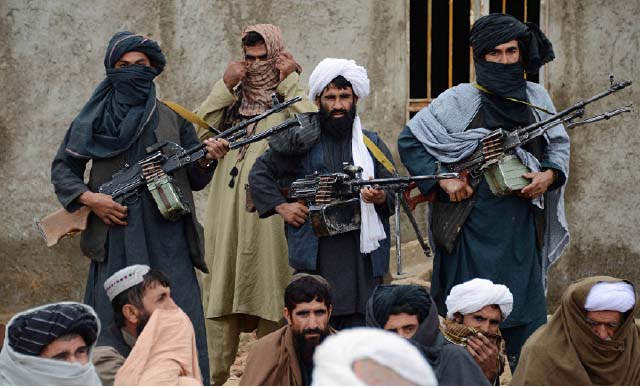The war and militancy continue unabated despite the peace discourse. Afghanistan, along with its political allies, seeks to bring the Taliban to negotiating table, however, the Taliban outfits insist on their preconditions i.e. complete withdrawal of the foreign forces from Afghanistan, official recognition of Qatar Office, removal of Taliban from United Nations terrorist blacklist and releasing their prisoners. Of late, the Taliban issued a statement denying the rumor of participating in peace talks brokered by the four-nation group – Afghanistan, Pakistan, China, and the United States. The Taliban once again reiterates that “unless the occupation of Afghanistan is ended, black lists eliminated and innocent prisoners freed, such futile misleading negotiations will not bear any results”. Last week, a former Taliban leader, Syed Akbar Agha, dubbed the four-ways talks in Islamabad and Kabul as “ineffective” because details of what discussed in the talks remained hidden from the nation and Taliban representatives were not present in the meeting held in Kabul on February 23, 2016. Similarly, the representatives of Taliban in Qatar said they are “unaware of plans for talks” and that they had not changed its preconditions for joining the peace process.
The statement ended hopes of the reconciliation negotiations commencing in the first week of this month — a timeline set by the four-nation group following the Kabul meeting. This is the second time that Quadrilateral Coordination Group (QCG) has missed the deadline. It had initially planned to open the talks in the last week of February.
Meanwhile, the US re-urged the Taliban to join peace talks and said Afghan and US forces would have to prepare themselves for the prospect of escalated violence in the spring and summer if the insurgent group did not agree to talk. “If there’s no peace process in place and the Taliban’s not willing to come to the table and talk about a reconciliation … we would and the Afghan security forces would have to prepare themselves, for the potential for increased violence in the spring and summer months,” the US State Department spokesman John Kirby said.
“They have a choice. Rather than continuing to fight their fellow Afghans and destabilizing their country, they should engage in a peace process and ultimately become a legitimate part of the political system of a sovereign united Afghanistan”.
In spite of the fact that the complete withdrawal of foreign troops is on the list of Taliban’s preconditions, Pakistani officials, who offered to host the first round of direct talks between the Afghan government and Taliban representatives, said that the abrupt pullout of US soldiers from Afghanistan was not advisable and the Afghan Air Force is to be supported and trained further.
Moreover, Pakistan downplayed the Taliban’s rejection of proposed peace talks saying that it hoped for progress “in coming days”. Sartaj Aziz, foreign policy adviser to Pakistan’s prime minister, said that Pakistan, the United States and China would use their influence to persuade the Taliban to come to the table to try to end a nearly 15-year-old war. Speaking at the Council on Foreign Affairs in Washington last week, he also said that Afghan Taliban’s leadership enjoyed shelter inside Pakistan, which was used as a “lever” to pressure the group into holding talks. He stated, “We have some influence on them because their leadership is in Pakistan and they get some medical facilities, their families are here. So we can use those levers to pressurize them to say, ‘Come to the table’.”
China also hoped that Afghanistan, along with concerned parties, would work together to bring the Taliban to the table. At a routine press conference, Chinese Foreign Ministry spokesperson Hong Lei said that the QCG had worked for creating favorable conditions for direct talks between the Afghan government and the Taliban and has played a positive role in building consensus and pushing forward the reconciliation process since its establishment. He said China was willing to play a constructive role in the resumption of the peace talks in Afghanistan, having respect for Afghan sovereignty and the will of concerned parties.
It is self-explanatory that the Taliban’s reaction is highly crucial towards the peace talks and the QCG is tasked to persuade them to sit around the table. Taliban always set ifs and buts and therefore, refused to declare a truce via holding a face-to-face talk. So, an amicable agreement between Afghanistan and the Taliban elements has changed into a dream that never comes true – in spite of the long lasting efforts made by Afghanistan and its allies. Likewise, the Afghan High Peace Council (HPC), which was established in 2010, gained no achievements albeit great sacrifices were made in this path. Hence, the hopes and optimism should be expressed on the basis of tangible results.
This should be noted that insurgency and terrorist attacks are intensified and the graph of combatants and non-combatants’ casualties increased in recent months. In other words, the discussion about peace negotiation brought no positive changes in the country and the warring parties continue their inroads without faltering.
If the QCG’s pressure and appeal do not work, Afghanistan will be on the alert for escalated violence in spring and summer. Thus, a fruitful outcome of resuming peace talk is still under doubt and baseless optimism, in this regard, is no more than an illusion.
Home » Opinion » Seeking Peace Talk – A Futile or Fruitful Effort?
Seeking Peace Talk – A Futile or Fruitful Effort?
| Hujjatullah Zia

